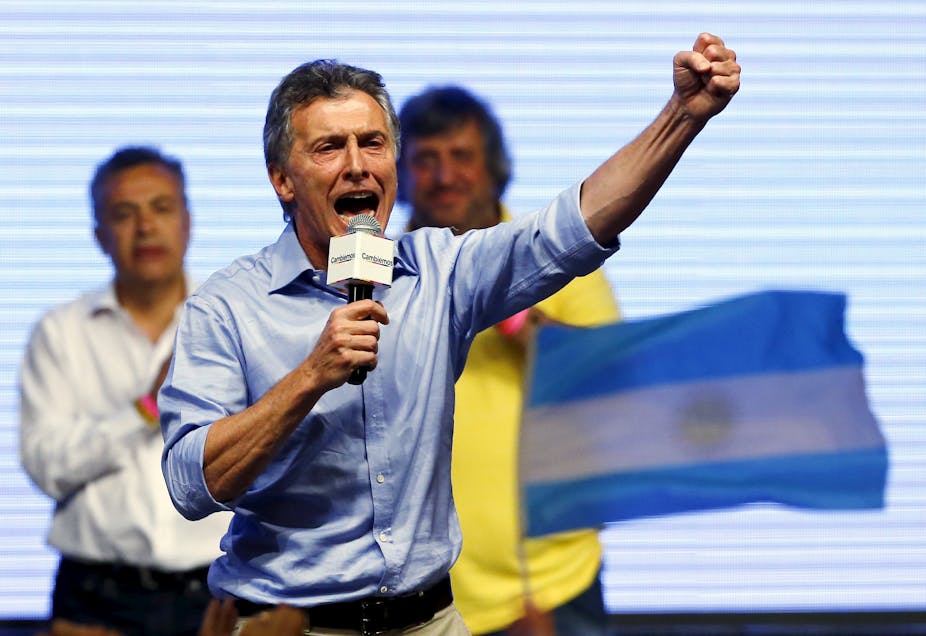Opposition candidate Mauricio Macri has won a comfortable victory in Argentina’s presidential elections. He will take office on December 10 as head of the Cambiemos (Let’s Change) coalition.
This political group is made up of strange bedfellows, including Macri’s conservative Republican Proposal party (PRO), social democrats, and the Radical Civic Union. The parties have worked together in a bid to oust Cristina Kirchner after three consecutive administrations by the Frente para la Victoria (FpV) party.
Macri won 51.5% of the vote, while his opponent Daniel Scioli won 48.5% for the FpV. This in a second round prompted by both failing to secure 45% of the vote in a first round held in October.
In electing Macri, the people have voted for a shift to the centre right. He has a mandate to introduce pro-market policies and move away from a state-controlled economy. He has also indicated that he would take a different approach to negotiating with Argentina’s international creditors and seek to build bridges with the US rather than continuing associations with “rogue” states such as Venezuela, Iran and Russia. Significantly, after Kirchner’s bellicose approach to Malvinas/Falklands question, he has also dismissed Argentina’s claim on the islands as little more than “an additional deficit” for a financially struggling nation.
Despite protests that such policies would cause economic chaos, loss of social benefits and sovereignty, Scioli failed to convince voters to stick with the Kirchner model.

Like many other countries in the region, Argentina has ridden a “pink tide” of leftist politics for more than a decade. Parties such as the FpV rose to power promising an end to the elite politics of the 1990s. But these projects have been seriously undermined in recent years.
Argentina recovered from the 2001 economic crisis – one of the worst in its history – under the presidency of Néstor Kirchner, who led the country from 2003. Under his wife Cristina, who took over in 2007, the nation made significant progress on reducing poverty, introduced same-sex marriage and a universal child benefit plan as well as higher pensions.
Despite her critics, Kirchner has mostly maintained Argentina’s economic progress in the face of global recession. She has also led a strong human rights crusade, encouraging the prosecution of military and civilians suspected of taking part in the “disappearing” of some 30,000 alleged dissidents during military rule.
The Kirchners focused their efforts on Argentina’s poor, and could afford to do so because of rising commodity prices and strong commercial and financial links with China. This funded welfare expansions, job creation and poverty reduction policies. Most of these far-reaching social programmes were undertaken in the context of serious international crisis and a relentless capital flight.
But the Kirchner administrations systematically concentrated executive authority. Both presidents stood accused of turning their backs on consensual negotiations and weakening political institutions. Political polarisation has grown particularly severe between the government and the agricultural industry.
Increasing inflationary pressures and accusations of government interventionism and corruption eroded support for Kirchnerism. The government acted as though social rights such as welfare support could be sought at the expense of political rights.
Time for change
The electorate has given Macri a mandate to rebuild the democratic mechanisms that have been jeopardised under the current administration and regain a place for Argentina on the international stage. As 48% of the population still back the Kirchner model any reform will have to involve consensus building.

Macri has many challenges ahead, not least because he has to govern a divided nation. The PRO and its allies are still in a minority in Congress, where the FpV remains strong. In the senate it still has the majority. He will have to design a parliamentary strategy to keep the Cambiemos alliance in tact in the face of pressure from the opposition.
As in many countries in South America, the legacy of the pink tide in Argentina is marked by significant social improvements, universal rights and more equitable distribution of wealth. Macri must bear this in mind when introducing more pro-market policies. He will leave himself vulnerable to his opponents if he compromises the rights of workers.

